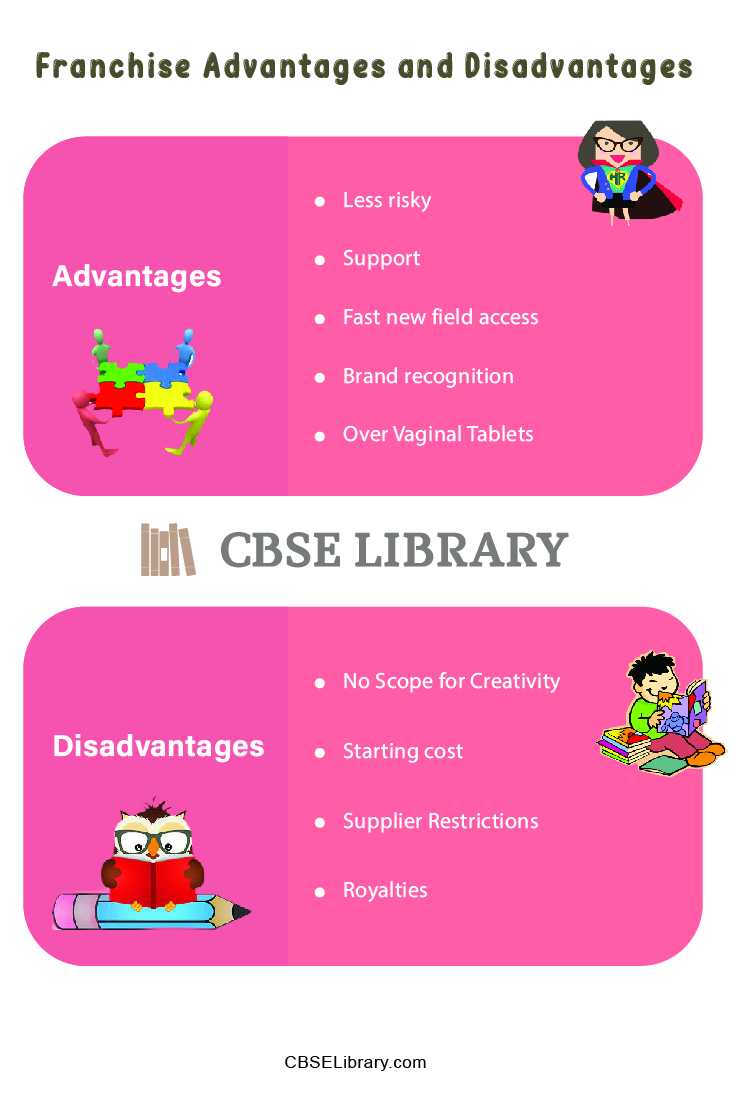Franchise Advantages and Disadvantages: A franchise is a kind of marketing business in which the Franchisor gives permission to a franchisee to run the business using the franchisor’s business system. A franchisee can be an individual or a group of people who run the owner’s business, like selling a product or giving services according to the franchisor’s business system. The whole business is done under the rules of the franchisor.
Students can also find more Advantages and Disadvantages articles on events, persons, sports, technology, and many more.
What is a Franchise? Advantages and Disadvantages of Franchise 2022
A franchise is a form of business that is run by a franchisee which is a group of people or individuals who get the work of marketing and distribution by the owner of the business system or franchisor. In this system, franchisees are granted to sell the product or provide services using the franchisor’s business system. All the rules and operating systems must be clearly disclosed to the franchisee. Initially, the franchisee has to pay some initial amount to the owner, and then annual fees are given according to the rates, which are decided related to the current market status.
- Advantages of Franchise
- Disadvantages of Franchise
- Comparison Table Between Franchise Advantages and Disadvantages
- FAQs on Franchise Pros and Cons
Types of Franchise
A Franchise is a system in which the trademark is given by the franchisor or owner to the franchisee to deal with the selling and distribution of the services or product by using the business system. There are many types of franchise models which are as follows
- Product Franchise: The product franchise is a type of franchise that is dependent upon the franchisee. Here the franchise takes all the responsibility for goods and services. Here the franchisee doesn’t have to follow any business model or system, they just work as dealers and just sell the goods and get them from manufacturers. So this is generally done for retailers who deal with the selling of branded or specialized products.
- Job-Franchise: This franchise is run by individuals with small or medium-sized businesses. It can be working from home or any mobile business which is run by the individual or owner.it can be managed with very little capital.
- Management Franchise: This type of Franchise can be easily managed because it runs totally according to the rules of the franchisor.
The franchise model gives many benefits and there are some drawbacks also of it. Let us discuss its advantages and disadvantages.
Advantages of Franchise
Here are some of the advantages of the Franchise model. Let us see in discuss some of its advantages
- Less risky: The franchise is always at low risk since all the trials and hard work are done by the owner. So it becomes less risky for the franchisee to take forward the trademark and do the marketing and distribution. Thus the franchisee will always be in minimum loss.
- Support: Franchisees always get support from the owner and are connected as trainees or learners so that in case of emergency, they will support to overcome any condition.
- Fast new field access: Since the business already had a setup and all the trials and errors are done then. There are very few challenges for a franchisee to continue the business system. It is easy to start a new job without any problems. All the work that has already been set up becomes easier to start a new business.
- Brand recognition: The Franchisor has good brand recognition, which helps the franchisee to build brand recognition instantly without any struggle.
Disadvantages of Franchise
Let us discuss some of its disadvantages
- No Scope for Creativity: The franchise is a proven system, so there is very less scope for any creative work. If the franchisee tries to make any changes, then it can result in a negative impact on the business.
- Starting cost: Starting a new business is can cost heavy as it is not easy to do the franchise. The cost depends according to the product’s brand and owner’s conditions. It can be costly for the franchisee to start with a heavy cost.
- Supplier Restrictions: Sometimes franchisees need to try new vendors or suppliers, but the franchisor mandates some of the suppliers to the company, which can be a drawback to the franchise.
- Royalties: Though the franchisor needs royalty from the franchise, it is essential in some prospects to make good relations continue between both parties. The royalties are decided by the franchisor, which can be negotiated by the franchisee.
These were some advantages and disadvantages of the Franchise and how it benefits the franchisor and the franchisee.

Comparison Table Between Franchise Advantages and Disadvantages
| Franchise Advantages | Franchise Disadvantages |
| Comparatively, it is less risky than starting a new business | Low creativity scope |
| Franchisor always supports the franchisee | Initial cost can be high |
| Easily access to a new venture | Limited suppliers are allowed |
| No experience is required | Sharing the profit |
| Brand recognition | No privacy |
| Low failure chances | Under control of owner |
FAQs on Franchise Pros and Cons
Question 1.
what is a franchise? What are its benefits?
Answer:
A franchise is a form of business that is run by a franchisee which is a group of people or individuals who get the work of marketing and distribution by the owner of the business system or franchisor. In this system, franchisees are granted to sell the product or provide services using the franchisor’s business system. The whole business is done under the rules of the franchisor.
Some of its advantages are as follows:
- The franchise is always at low risk since all the trials and hard work are done by the owner. So it becomes less risky for the franchisee to take forward the trademark and do the marketing and distribution. Thus the franchisee will always be in minimum loss.
- Franchisees always get support from the owner and are connected as trainees or learners so that in case of emergency, they will support to overcome any condition.
- Since the business already has a setup and all the trials and errors are done, then there are very few challenges for a franchisee to continue the business system. It is easy to start a new job without any problems. All the work that has already been set up becomes easier to start a new business.
- The Franchisor has good brand recognition, which helps the franchisee to build brand recognition instantly without any struggle.
Question 2.
What are the types of Franchises?
Answer:
A Franchise is a system in which the trademark is given by the franchisor or owner to the franchisee to deal with the selling and distribution of the services or product by using the business system. There are many types of franchise models which are as follows
- Product Franchise
- Job-Franchise
- Management Franchise
Product Franchise: The product franchise is a type of franchise that is dependent upon the franchisee. Here the franchise takes all the responsibility for goods and services. Here the franchisee doesn’t have to follow any business model or system; they just work as dealers and just sell the goods and get them from manufacturers. So this is generally done for retailers who deal with the selling of branded or specialized products.
Job-Franchise: This franchise is run by individuals with small or medium-sized businesses. It can be working from home or any mobile business which is run by the individual or owner.it can be managed with very little capital.
Management Franchise: This type of Franchise can be easily managed because it runs totally according to the rules of the franchisor.
The franchise model gives many benefits and there are some drawbacks also of it. Let us discuss its advantages and disadvantages.
Question 3.
what are the drawbacks of franchises?
Answer:
Here are some drawbacks of franchise
- Creativity scope of franchisee reduces
- Staring new franchise can be costlier
- Sharing the profit
- Suppliers are limited and restricted by the franchisor
